Africa Cries Out Report 2023014 My Diary of Senegal medical mission trip
Author Cynthia Shi, 9th grade, Princeton High School, NJ
3/17



My first impression of Senegal was that it was scorching. The sun shone down, and I felt my skin burning after standing outside for just a few minutes. As we drove to the base, I saw so many clay houses that looked like they were about to keel over, and kids running around the dirt roads with no shoes.
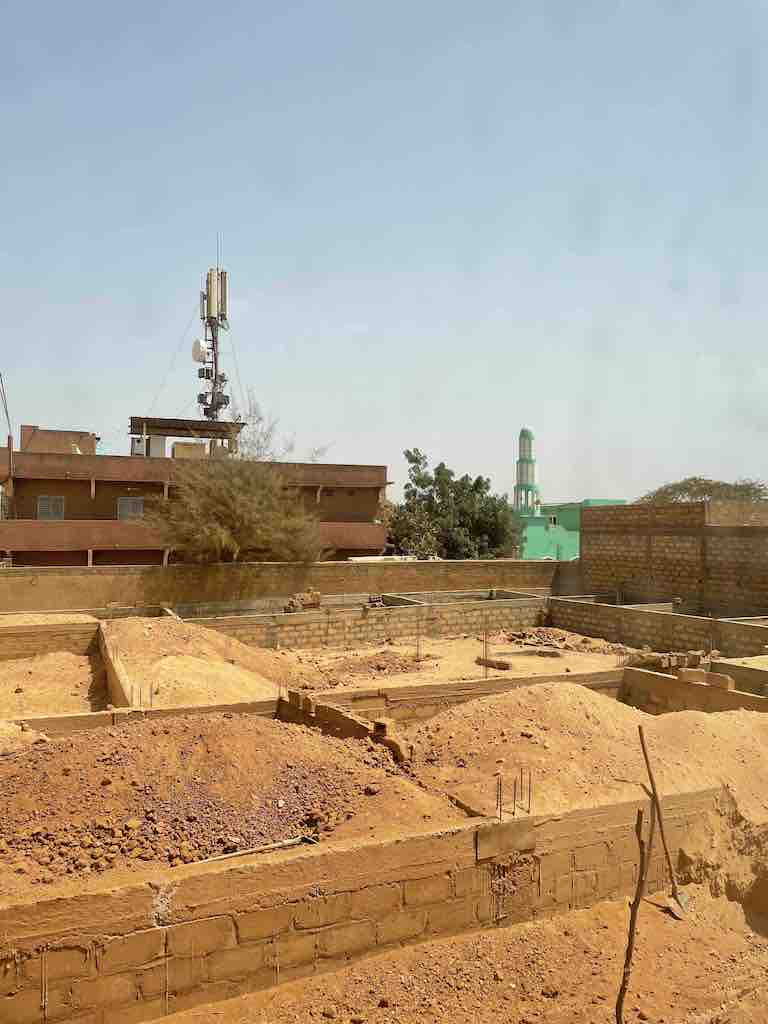
As soon as we walked into the base, it was work time. When we arrived, we had to sort all the medical supplies, such as pills, vitamins, and syrups. We unpacked all of the hundreds of boxes and then split the ready-to-transport materials into 11 different places, for the 11 villages we would be visiting throughout the trip.
That was already quite the workout for me, and we had only begun. because now, we had to sort the pills into thousands of little baggies that could be given out. We sat there for at least 8 hours in a burning room counting each pill individually and separating them into equal doses, and finally putting them into bags. At the end of the day, even though we hadn’t moved that much, I was drenched in sweat.
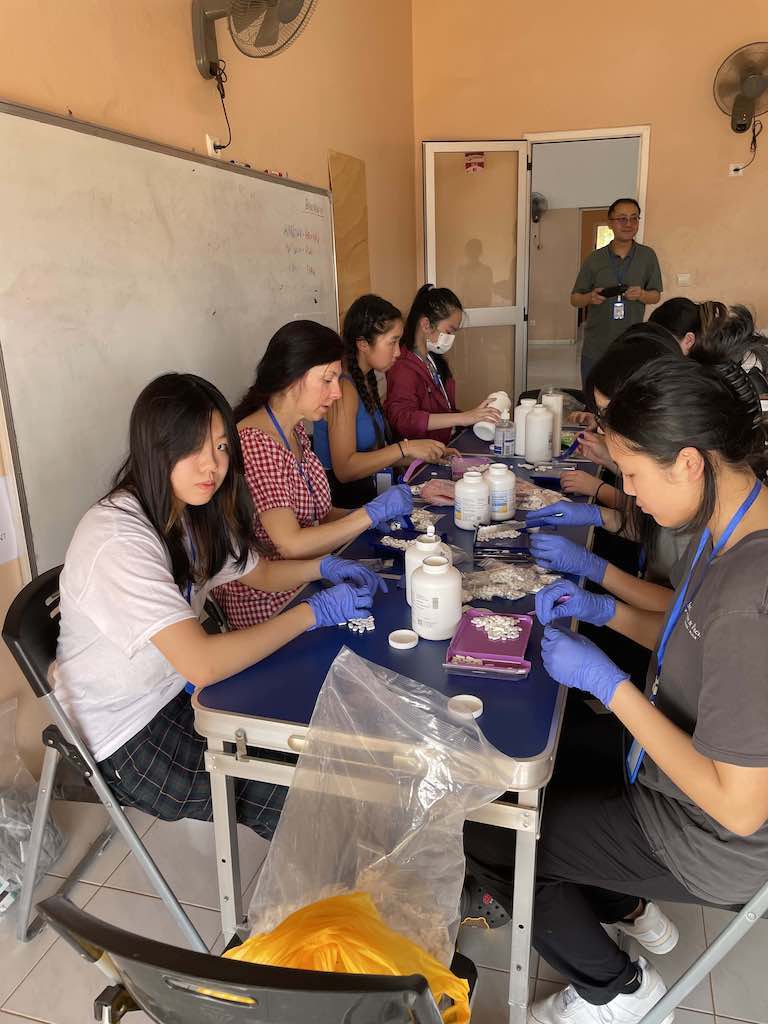
The surprises didn’t end there, the toilets that didn’t flush, the sinks and showers that didn’t have water almost all of the time, and the persisting heat of the base put into perspective how privileged I had been. Even now, the base conditions are significantly better than almost anywhere else in Senegal.

3/18
The second day was not easier than the first. At 5 AM, my roommates and I all dragged ourselves out of bed for breakfast duty. Considering our jetlag from just having landed a little more than a day ago, waking up was not an easy task.
When we looked at the materials that we had to prepare breakfast, we were discouraged. The only food that we had was eggs, ham chunks, and baguettes that were as hard as rocks. We decided to make scrambled eggs and serve the baguettes on the side. Then, one of the leaders told us that we had to ration the egg portions, as we had to make them last for a week. In the end, when we managed to figure out that we could use milk to make more scrambled eggs, we could finally begin cooking. Except, we couldn’t figure out how to light the stove. In the beginning, we couldn’t even get a spark, even after holding the lighter to the stove for what seemed like an eternity. Then, the stove would suddenly erupt in flames which would immediately die down. We found out that the stove fire could jump extremely high the hard way, as one of my friends got their fingertips burned off.
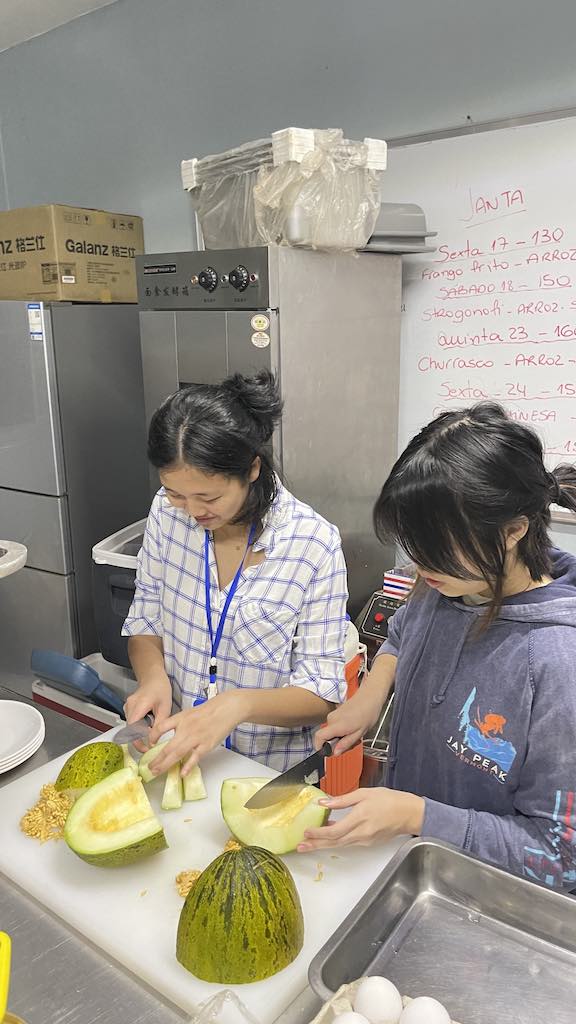
As soon as we had finished breakfast, it was more work. Today was a little different though, doctors had begun seeing patients. The youth was split into 3 groups, the first group was pill sorting, the second group was in the pharmacy, or giving out the prescribed medicine, and the third group was the doctor’s assistants. I began pill sorting and continued until 1PM, when I started to shadow a gastroenterologist, called Doctor Chen. We saw many different patients, and I learned how to write a prescription. We met patients with arthritis, fevers, STDS, UTIS, high blood pressure, diabetes, and stomach issues. After 4 hours, we had seen more than 200 patients, and I learned so much. I learned the common medicines for common issues that we saw and how to find medicines. I noticed that a lot of people here had similar health issues, such as stomach issues (because of the unsafe water, bad health conditions, and lack of food diversity), high and low blood pressure, as well as high and low blood sugar.
What shocked me the most was how young some of the mothers were. I saw a girl the same age as me, with children already. It put into perspective how different lives could be, because the most I ever stressed about was my grades or social situations, but people the same age here had to deal with the responsibilities of being a mother.
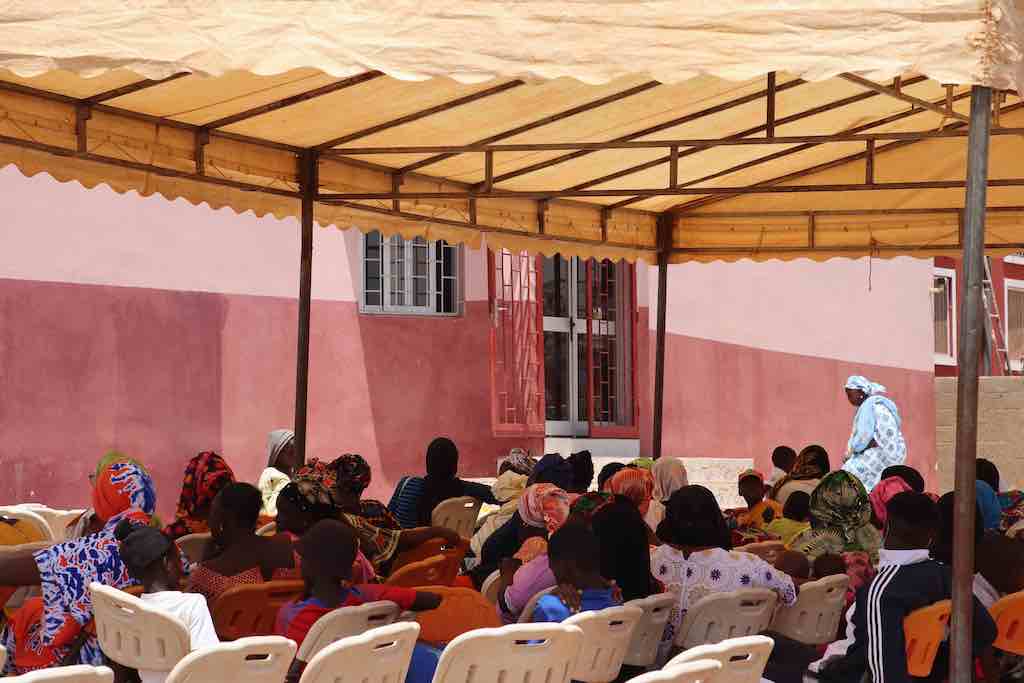
3/20
Waking up at 4 AM in the morning with food poisoning is not a good feeling. I’ll spare the details, but as someone who has had many cases of food poisoning, this one was by far the worst. I was shaking and had to sit down, chugging electrolytes hoping to fix it soon, because we had a 12-hour journey ahead of us today. One of my roommates also had food poisoning, and hers was so bad that she couldn’t even go on the bus ride. I later found out that we weren’t even supposed to wash our mouths with the tap water when brushing our teeth, which is what I had done multiple times before that.
What heightened my anxiety was that my mom was somewhere hours away from me, in the city of Dakar, since she was part of the Surgical team and would not be making the 12-hour journey across Senegal with me. I had been away from my mom before, but never in a foreign country, and especially never when I had been sick. I was so scared that I would throw up or get sicker on the bus. I eventually calmed down after I reassured myself that everything would be fine.
The rest of the day was uneventful, as we were just riding the bus to Kedougou. By the time we arrived, my stomach had mostly calmed down. Kedougou was even hotter than the base. In addition to being extremely hot (100F even at night), there was a newfound humidity in the air, which led to a never-ending stream of sweat. Unbeknownst to me, there were also mosquitoes here, which I had not known, so I got bit several times. Usually, getting a couple of mosquito bites isn’t that bad, except for the fact that some of the mosquitoes might carry malaria, and I didn’t have any malaria medicine.
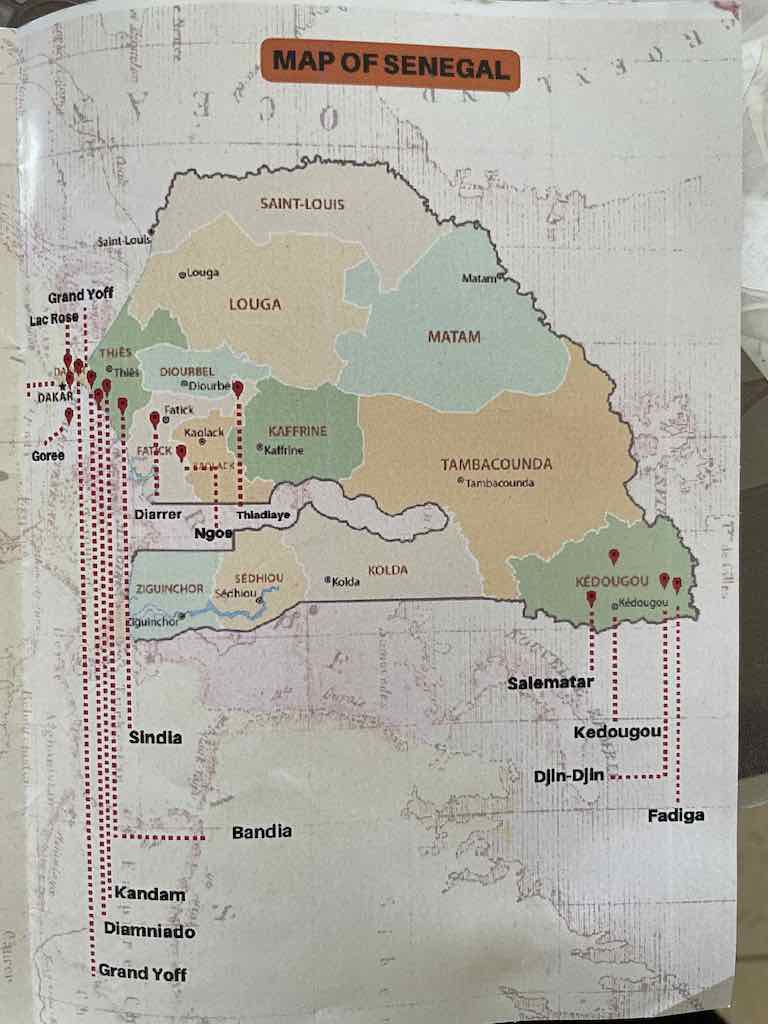
3/21
First thing in the morning, it was time to get moving! One of the groups was going to a village with leprosy patients, while the other two (including mine) would be going to a separate village.
The road conditions were particularly bad heading to Salimatar. The drivers who could usually clear turns with less than a few inches of clearance, struggled greatly. Eventually, we got to the village late and began moving quickly.
I was on front desk duty, which meant I would be taking names, ages, blood pressure, and temperature, and guiding patients to where they needed to go (i.e. doctor, pharmacy). This proved to be quite difficult, with the ridiculously hot weather and lack of materials. The front desk group decided to divide and conquer, and I was assigned temperature taking. However, I soon found out that there were no batteries inside any of the thermometers. Luckily, one of the others had the exact batteries in her flashlight, which she generously gave up. The language barrier was quite difficult, especially when trying to direct patients to certain places. So after a few hours, I picked up a few phrases so life would be a bit easier for everyone.
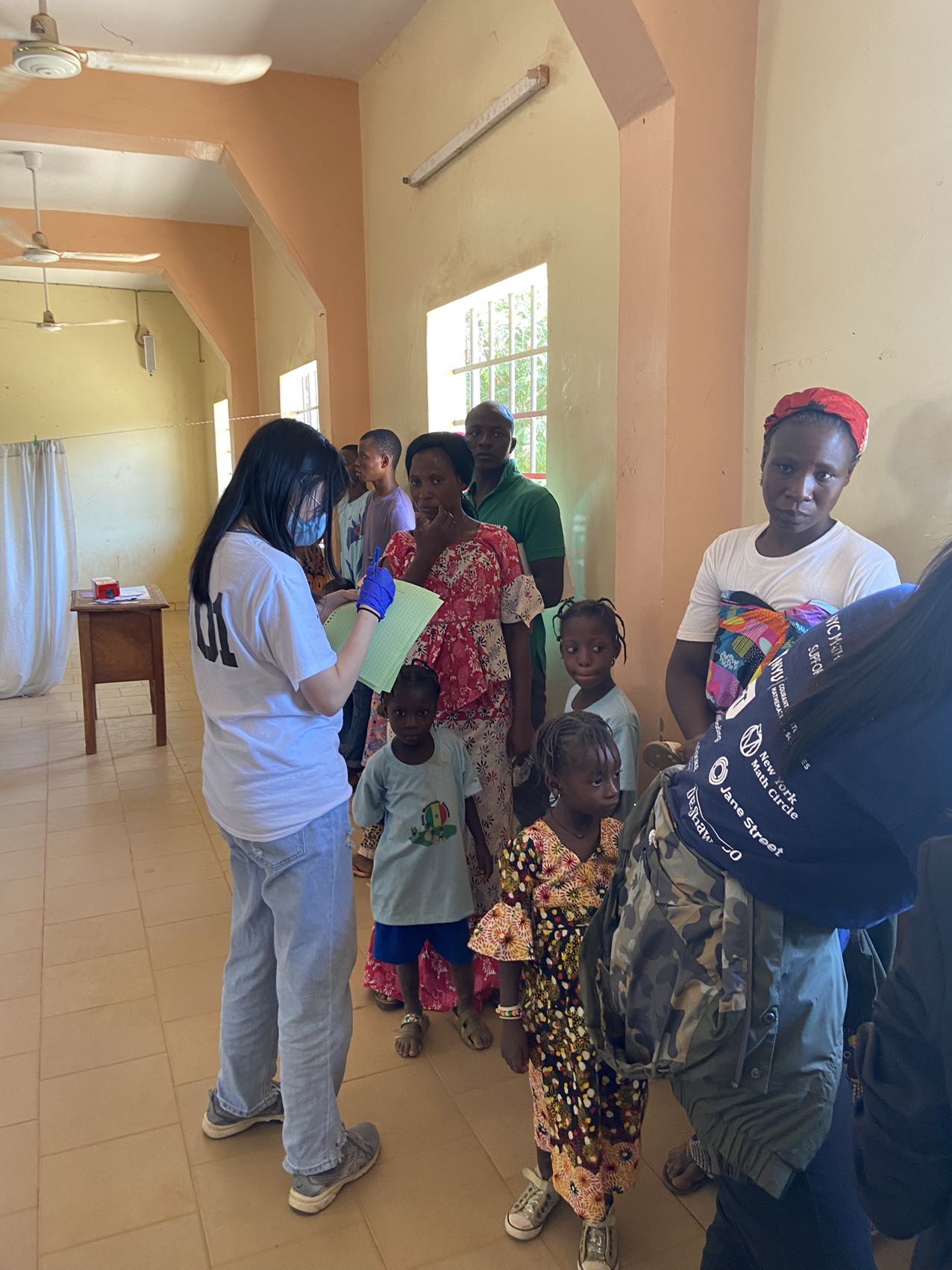

In the afternoon, I was put on pharmacy duty. It was hard at first because I didn’t know where anything was and the long names of medicine got mixed up in my head frequently. Luckily, a local man who had been with the volunteer group for more than a decade was practically a professional. I was so impressed that he immediately knew where everything was and what the medicine was for that I couldn’t help asking him if he was a pharmacist. He just laughed and said no, and that it had taken him a few years to learn. I was astounded, this man had learned everything just from pure grit. After a while, I got more familiar with the medicine names and placements of the medicines.
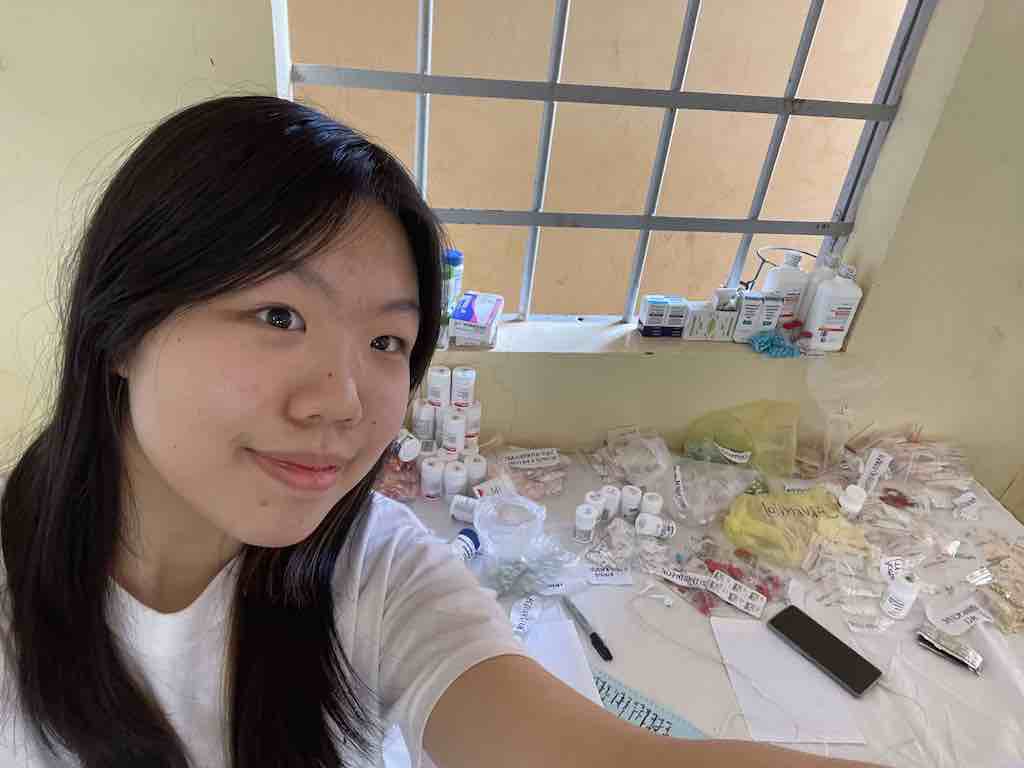
We finished quickly and began packing up at about 5PM, having seen more than 200 patients. We were all relieved and ecstatic that we were almost done.
On our way home I saw a forest fire. The fire covered a large area of trees and looked like it was still spreading. One of the adults told me that the reason these fires occur is that the people in Senegal burn their trash, because they have no trash disposal system (which is why there is trash all over the roads), and the dryness and wind cause the fires to spread just by the slightest breeze.

Eventually, our group leader told us that we were going to take a detour because a local pastor asked us to donate rice and pray for his community. The bus couldn’t go down the road, so we all got out and walked a few miles to the house. It was a painful walk, especially since we were all so tired, but seeing the joyed faces of the locals after we hauled dozens of bags of rice and other food to the pastor’s house was worth it.
3/22
Today we were going back to the base. Unfortunately, now a dozen people had food poisoning or some kind of stomach problems. People were throwing up left and right on the bus and my other roommate(not the one who already had food poisoning) also got sick. To add to these people’s discomfort, the air conditioning broke on our bus. The stink of the throw-up and the sticky heat inside of the bus certainly did not help.
A number of the adults had speculated that the food poisoning was from the bread, because all of the food we ate was packed before the trip, and the high heat could have easily spoiled the bread.
When we finally got back, we unpacked all of the unused materials and sorted more medicine for the next day of volunteering.
At night, one of my friends introduced me to the tower, a rickety-looking steel structure that you could climb to see a beautiful view of the village. I climbed the tower extremely carefully because I’m afraid of heights. When we got to the top I could see the entire village and the lights of the city in the distance.

3/23
Waking up with your roommate throwing up in a water bottle is not pleasant. Pretty much everyone in the base has gotten sick. Two of the teenagers have fevers, and a bunch of them have a sore throat. Also, pretty much everyone has food poisoning. Nevertheless, life goes on. Breakfast duty has gotten a lot easier after figuring out how to use the stoves and getting better at using limited materials.
Today, we went to a village about 40 minutes from the base, called Thiadiaye Village. We actually got there on time and found out the building we would be operating out of was an elementary school. I’ve gotten pretty used to the cycle of open clinics, but today the acupuncture doctor was going with us. She hadn’t been able to work at all because of extreme food poisoning and I was excited to see what acupuncture could do, because I’d never seen anyone give acupuncture before.
First thing in the morning, I started shadowing an eye doctor called Doctor Chen. The number of patients with impaired vision or blindness was astounding. A lot of the patients had cataracts in their eyes, which looks like a light blue fragment in the eye. I finally got to help some of the kids that I saw shoes that I had collected. I helped a girl find a pair of pink Nikes she liked, and she was so sweet. She even asked the translator if we could be friends and I gave her my number and also promised to come back to the same village next year.


In the afternoon. I shadowed a radiologist, called Doctor Vicky (who was also my roommate). I worked with her for a few hours and learned a lot about anatomy from her, as well as testing blood sugar for a couple of patients.
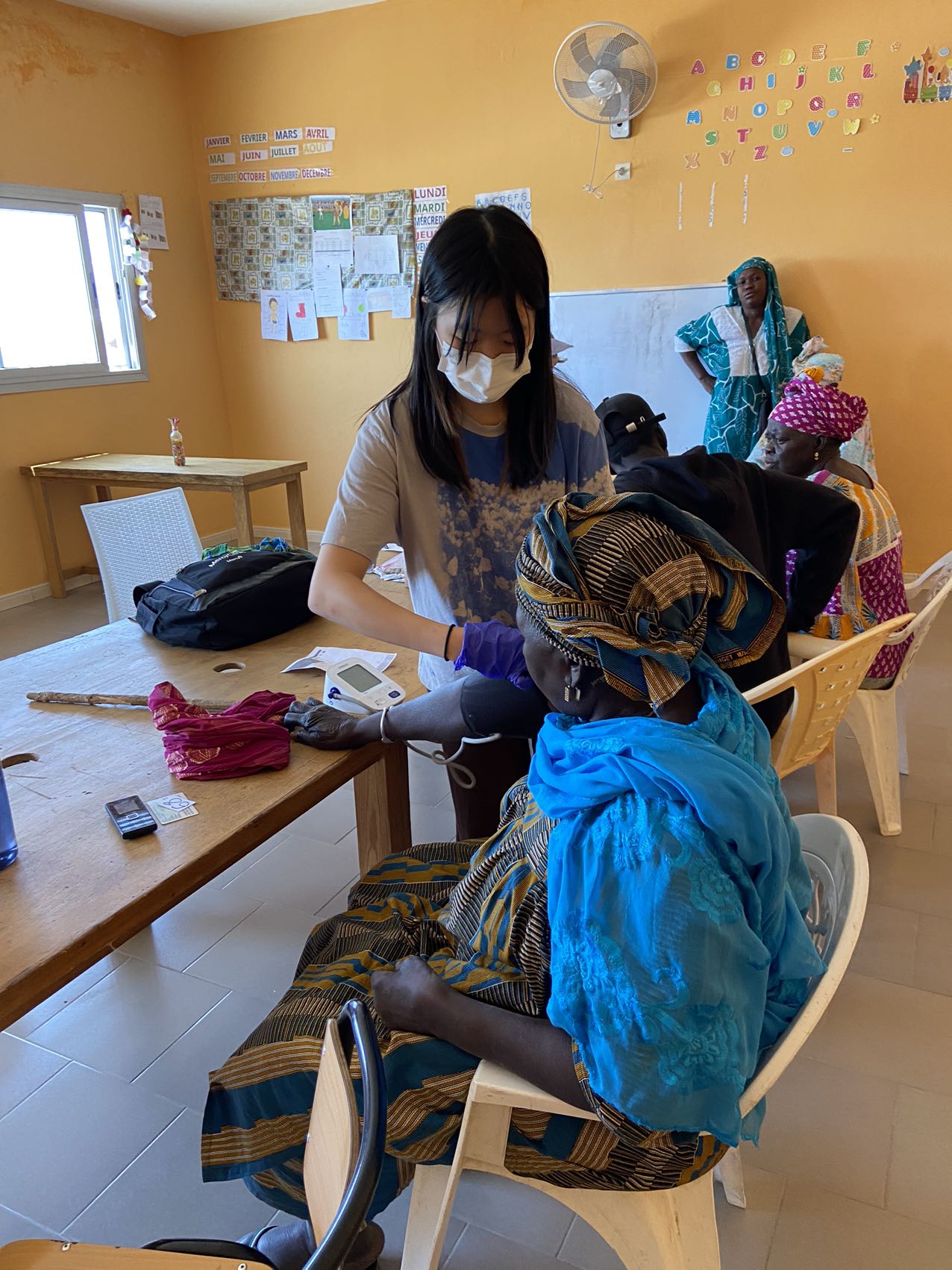

A little later, one of the pediatricians from the surgical team comes and begins seeing patients. I end up assisting him and he was so patient and helped patients many times without medication. So many patients were children, so he had so many patients to work through. We wrapped up on time, seeing more than 200 patients
At dinner, I started talking to one of the students who went to school in Senegal. I learned so much about the culture, lifestyle, and government of Senegal.
3/24
Today, we drove to another village that was slightly farther from the base than the last. The conditions were pretty bad, the cubicles were small and separated by thin fabric that couldn’t stop any sound. It was hard to hear anything the patients said or what the translator said. Also, the pharmacy was hard to set up because there were no windows to hand the medicine out of, so we had to hand it out through a small door.
I began shadowing Dr. Vicky again, and we saw many patients. A lot of them spoke Creo-French, which our translator didn’t speak, which resulted in quite the struggle to find someone who could translate.

One patient that stuck with me was a woman who came in and told us that she was 12 months pregnant. The doctor I was shadowing was very confused as well, and she thought it could have been a mole baby. In the end, we decided to bring her back to the base with us so that when the surgical team with an OBGYN specialist came back later that day, they could perform an ultrasound on her. I was very lucky and got to shadow the ultrasound and was shocked to see the patient have to lie on the ground and all the doctors kneeling around her, because there were no beds or chairs.
Later that day, the surgical team came back and resolved the problem the patient was going through, which was nothing serious. I was so glad to be back with my mom after almost 5 days alone. I was so relieved that nothing went wrong during that time.
At dinner, we gave the laptops/Ipads, and shoes I had collected to the students of a local school. They appreciated it and we spent the night teaching them how to use search engines and some fun games to play. Also, the local church and restaurant collaborated to cook a delicious Asian-themed dinner for us. There were so many different types of food and I ate so much that I almost threw up because I had been eating ham sandwiches for the past week.


Editor in charge: Liu Hui, Wu Hao, Guo Yuanchun, Duan Xiaohong
